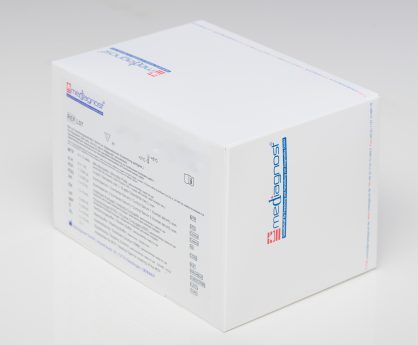Human Adiponectin ELISA Assay
The Human Adiponectin ELISA Assay is For Research Use Only
Size: 1×96 wells
Sensitivity: <0.27 ng/ml
Standard Range: 2-100 ng/mL
Incubation Time: 1.75 hours
Sample Type: Serum, Plasma
Sample Size: 10 µL
Manufactured by Mediagnost
Assay Principle
The Eagle Biosciences Adiponectin ELISA Assay Kit is a so-called Sandwich-Assay using two specific and high affinity antibodies. The Adiponectin in the samples binds to the first antibody coated on the microtiter plate. In the following step the second specific anti-Adiponectin-Antibody binds in turn to the immobilised Adiponectin. The second antibody is biotinylated and will be applied in a mixture with a Streptavidin-Peroxidase-Enzyme Conjugate. In the closing substrate reaction the turn of the colour will be catalysed quantitatively depending on the Adiponectin-level of the samples.
Standards
Specimen
Serum and heparin plasma levels are comparable. In EDTA- and Citrate Plasma-samples levels were found approx. 18% lower, because of the relatively high amount of anticoagulant. Adiponectin can also be measured in urine, breast milk and cell culture media by this test system. The blood sample for serum preparation should be gained according to standardized venipucture procedure. The samples should be stored without anticoagulation reagents. Hemolytic reactions have to be avoided. The blood has to be allowed to clot and after complete clotting, serum is separated by centrifugation.
Related Products
Mouse Adiponectin ELISA Kit
Rat Adiponectin ELISA Assay
Adiponectin High Sensitive ELISA Assay Kit



